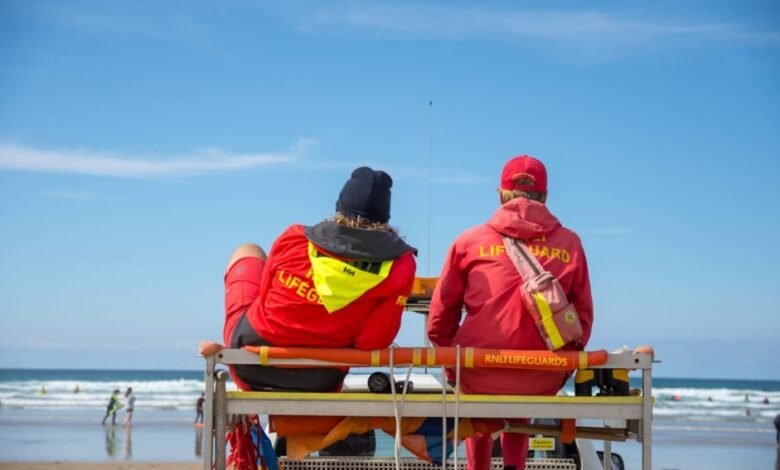Dive into Summer: Smart Ways to Enjoy Water While Beating the Heat

Hot weather, sunshine, and water adventures define summertime. Almost immediately, summer is related to water-busting activities: a day at the beach, pooling at a neighbor’s house, or spontaneously going out on the lake. But, with all that freedom comes a big dose of caution, of which prolonged exposure to sunlight is one. Managing fun under the sun while in water is more than safety advice; it is an essential aspect in everyday life for those working in aquatic environments or preparing for lifeguard certification.
Especially when combined with physical activity in and out of the water, all-day sun may yield fatigue, sunburn, and dehydration. This is especially critical for the students of lifeguarding undergoing training hours in boiling sunlight. Proper knowledge of sun safety provides water enthusiasts and trained professionals with superior outdoor fun without the harm of UV rays.
Picking the Perfect Sunscreen and Protective Gear
When going to the beach in the summer months, here are some things that are not negotiable: sunscreen is one of them. The sun rays near water are lethal and can damage your skin. For protection from these rays, sunscreen is the most popular remedy. Outdoor sun-related activities can lead to sunburn, therefore it is always going to be a top priority to have sunscreen when heading out into the sun.
Having waterproof and sweat proof formulas especially come into play in lifeguarding training situations as a participant may be exposed to sun for many hours during exercises, or tests. Sunscreen is also talking down the effectiveness of physical barriers. Any summer outfit an individual wears should have, at a minimum, rash-guards, broad-brimmed hats, and UV- protective sunglasses as a norm. These items are not only good for lifeguards but also part of the professional image expected of certified employees.
Recognizing the Value of Resting and Recovering
Regardless of how passionate you are about water activities, taking breaks is critical. Long exposure to sunlight and water might reduce energy levels, dull reflexes, and harm decision-making ability. If they do not reserve time for relaxation and recovery, lifeguards, who have to be alert constantly, are particularly vulnerable to weariness.
Good lifeguard training includes break times in their workout plans so that students may cool down, replenish, and mentally reset. Recreational swimmers can adopt the same approach by restricting swim durations to bearable sessions, then resting in the shade. This cyclical approach improves safety for all near the water and helps to preserve top performance.
Designing secure water entertainment for everybody
It is imperative for those who oversee or run aquatic facilities to establish a setting that encourages sun safety. Providing shaded seating, reminding visitors to apply sunscreen, and guaranteeing accessible, clean, cold water are some ways to accomplish this. Usually, those assigned to enforce these criteria and enlighten the public are lifeguards who have received the necessary certification.
Being a role model is also a component of establishing a secure atmosphere. By wearing protective gear, staying hydrated, and taking regular breaks, lifeguards ought to demonstrate sun safety. Their conduct establishes a standard for others to abide by and also keeps them secure. In this way, lifeguard certification acts as evidence of leadership and responsibility in aquatic safety rather than merely proof of skill.
Lifeguard instruction underpins awareness of sun safety
Apart from imparting rescue skills, lifeguard training sets the stage for a thorough grasp of environmental awareness, which also covers sun and heat safety. From hydration techniques to spotting sunstroke symptoms, a good lifeguard program teaches participants a whole approach to safety. Many lifeguard training and certification programs include modules on first aid for sunburn, heat stroke, and dehydration, therefore giving students the means to address a great number of sun-related emergencies.
This thorough preparation equips lifeguards to execute their responsibilities in the extreme heat of summer. People who complete lifeguard training also grow in self-awareness of their physical capabilities and how to keep performance under pressure. These are lifelong abilities that help their leisure activities in and near water as well as their job responsibilities.
Trusting Recognized Authorities for Lifeguard Education
When it comes time to select a lifeguard certifying agency, it is important to choose a certifier that is credible and serious. The American Lifeguard Association is well known for its credible programs and brings serious training that is focused not only on technical skill but also on environmental awareness. Their classes are geared towards preparing people for real-world issues and conditions that focus on severe storms, sun exposure, and emergency preparation.
The American Lifeguard Association balances theory and practical experience for its certified lifeguards in order to prepare them to address the needs and demands of aquatic environments. For candidates serious about water safety, life-saving certification, and providing emergency response, there is no better way to become trained than through lifeguard training.
Final Word
Although it is a luxury to enjoy the sun in summer, it comes with duties—especially around water. Knowing how to manage heat is essential for performance and safety, whether you are training for a lifeguard position, swimming with buddies, or are now certified. Everyone can welcome the delights of summer without the sting of the sun by utilizing adequate hydration, protective gear, wise scheduling, and formal training. Sunsmart aquatic pleasure is not only achievable but also the new norm with the help of committed training organizations like the American Lifeguard Association.






